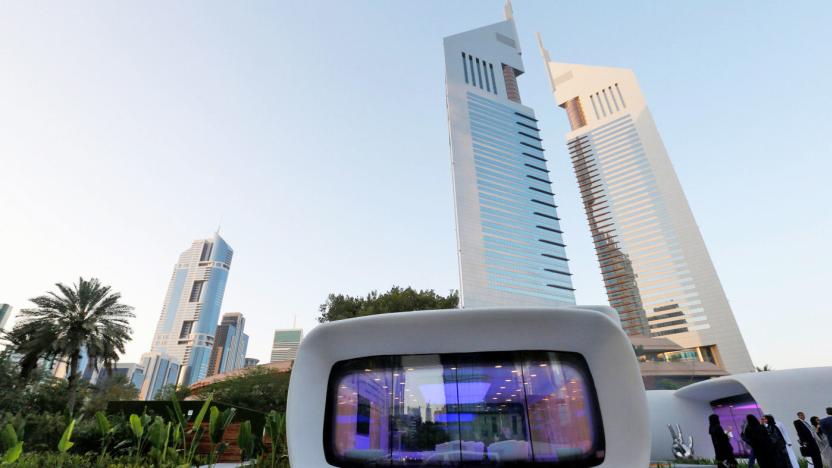UnitedArabEmirates
Latest

US lifts laptop ban at Abu Dhabi airport
The US is scaling back its ban on laptops for Middle Eastern flights headed to the US... though it's not because officials believe everything is safe. The Department of Homeland Security has exempted Abu Dhabi International Airport from the ban (which also covers tablets) after verifying that Etihad Airways has properly implemented "enhanced security measures." While the agency isn't clear about what those are, they include tighter screening for both people and the devices they carry aboard.

Apple patches three zero-day exploits after activist is hacked
Apple has rolled out a patch for three previously unknown zero-day exploits that were used to target the iPhone 6 of Ahmed Mansoor, an award-winning human rights activist based in the United Arab Emirates. Security company Lookout and internet watchdog group Citizen Lab investigated the attack on Mansoor's iPhone and found it to be the product of NSO Group, a "cyber war" organization based in Israel that's responsible for distributing a powerful, government-exclusive spyware product called Pegasus.

NASA and the UAE team up on space exploration
NASA wants whatever help it can get for its journey to Mars, and it's willing to forge some unusual partnerships to make that happen. Case in point: the agency has reached an agreement with the United Arab Emirates that will have them cooperating on space exploration. The deal lets them share everything from data and research facilities to aircraft and spacecraft. Mars exploration is the initial focus of their cooperation, but they'll look at other areas where they can work together.

World's first 3D-printed office opens in Dubai
The world's first 3D-printed office building opened this week in Dubai, Reuters reports. The 2,700-square-foot, single-story building was built in just 17 days using a gigantic, 20-foot tall 3D printer and a special mix of concrete, fiber reinforced plastic and glass fiber reinforced gypsum.

Dubai will host the World Future Sports Games in 2017
Apparently, the World Drone Prix was just the tip of the robotic sports iceberg. Dubai has announced that it's holding the World Future Sports Games, a broader competition, in late December 2017. The tech-focused event will include drone races as well as "robotic swimming, running, wrestling and car racing" -- basically, it's the Olympics for automatons. If it's successful, the plan is to hold the Games every two years after that.

Dubai building will be entirely 3D printed, right down to the furniture
The uses for 3D printing are seemingly endless. We've seen the tech used by doctors, to build cars and for construction. While parts of a building have been 3D printed before, the United Arab Emirates National Innovation Committee is working to use the method for an entire office building in Dubai. Working with WinSun Global and a few other companies, the committee plans to use a 20-foot tall 3D printer to make everything on-site rather than fabricate the pieces and have them transported for assembly. WinSun Global has already printed a six-story apartment building and a house in China. As you might expect, the structure is small, measuring 2,000 square feet.

Here's what it's like to fly over Dubai with a jetpack
Dubai already seems pretty futuristic on the ground, but what's it like in the air? As you'll soon see, it's almost like another planet. Yves Rossy (aka Jetman) and "protégé" Vince Reffet recently flew over the extravagant city in jetpacks, and their view was every bit as strange as you'd expect. The Burj Khalifa tower (above) resembles a sci-fi super weapon, while the artificial Palm Jumeirah archipelago sticks out from the coastline like a sore thumb. Will this airborne sightseeing trip get you booking a flight to the United Arab Emirates? Probably not, but it's worth a look if you're wondering what a ton of oil money will do to a desert landscape.

Tour one of Earth's grandest deserts in Google Street View
Visiting a large desert in person can be difficult. Roads will only take you so far, and you probably aren't used to navigating gigantic sand dunes. Thankfully, you no longer have to plan a whole adventure just to see this austere beauty at ground level. Google has used camel-mounted Trekker cameras to bring Street View to Liwa, an oasis-laden desert in the southern end of the United Arab Emirates. The move gives you 360-degree panoramas of everything from massive dunes (up to 131 feet high) to date farms. This won't compare to making the trip yourself, but it'll probably be much more comfortable.

Dubai's beating the heat with Mall of the World, a massive climate-controlled city
Dubai is hot. Summer temperatures can easily exceed 110 degrees Fahrenheit, and desert conditions can mean weeks without relief. The city is already home to a slew of all-weather venues, such as Ski Dubai, the Middle East's first indoor ski resort, but the UAE's latest project could bring comfort to millions of residents and annual visitors. Mall of the World, as the complex is to be named, will include 20,000 hotel rooms, making up some 100 hotels and apartment complexes, the world's largest indoor theme park, an 8-million square foot mall and a 3-million square foot "wellness district," with doctors and inpatient facilities for medical tourists.

Distro Issue 60: Infinitec's rebirth gets Kickstarted in the Dubai desert
Another week has come to a close and that signals the arrival of a brand spanking new issue of our weekly e-magazine. This time out, Darren Murph makes the trek to the United Arab Emirates to chat with Ahmad Zahran about how crowd sourcing has jumpstarted his company, Infinitec, for a second time. We also pay a visit to the Paris Auto Show to take a gander at the latest in transportation tech, while Amazon's Kindle Paperwhite and the Samsung Galaxy S Relay 4G get the full review treatment. "Eyes-on" tackles a suitcase full of sound, "Weekly Stat" offers a look at data consumption amongst Android users and NVIDIA's Nick Stam tells all in the Q&A. Grab a spot in your favorite reading chair because the latest issue is just a few clicks away. Distro Issue 60 PDF Distro in the iTunes App Store Distro in the Google Play Store Distro APK (for sideloading) Like Distro on Facebook Follow Distro on Twitter

UAE plans enterprise-class messaging ban for individuals and small companies?
Seems the United Arab Emirates wasn't satisfied with the spying agreements that RIM put in place -- now, the government's Telecommunications Regulatory Authority will reportedly restrict BlackBerry Enterprise Server (BES) services to companies with more than twenty BlackBerry accounts each. Interestingly, the TRA itself denies that any services will be halted to individuals or small firms, even as RIM itself claims that such a ban will indeed take effect, though RIM also claims that it "would be an industrywide policy applying equally to all enterprise solution providers," happily suggesting that competitors would also be affected. The ban is apparently scheduled for May 1st, so there won't be long to wait -- at the very least, we'll see who's telling the truth two weeks from today.

UAE says BlackBerry is now compliant with regulations, free to rock on
The latest thrilling installment in BlackBerry's Middle East saga has turned out not to be so thrilling after all. Having set an October 11 deadline for RIM to comply with its "telecommunications regulatory framework," the United Arab Emirates is today reporting that the BlackBerry maker has managed to make the necessary changes with plenty of time to spare. Consequently, there'll be no state-ordained curtailing of email, web, or BBM services within the UAE, which mirrors similar agreements that BlackBerry has managed to finagle with India and Saudi Arabia. Of course, the grand purpose of the UAE's ultimatum was for RIM to allow the state access to encrypted messaging communications, and while the current announcement is pointedly missing details on what's been done to appease the Abu Dhabi decision makers, we can't imagine them giving up the fight without RIM making some type of concession. And the shady, undisclosed concessions happen to be our least favorite kind.

iPhone 4 hits UAE and Qatar, but without FaceTime installed
The iPhone 4 launched this weekend in Qatar and the United Arab Emirates, but buyers wound up with a surprise -- their handset's front-facing cameras couldn't do FaceTime. The National reports that the video chat feature is missing from phones sold at UAE carriers Etisalat and du, as well as those from Vodafone Qatar. Carriers are blaming Apple for the missing feature, and spokespersons from both Etisalat and Vodafone say they're speaking to Cupertino about reinstating FaceTime post-haste; It was reportedly advertised on Middle Eastern versions of Apple's iPhone website until around September 20th, when all references to FaceTime were removed. TUAW reports that some UAE denizens have actually tested FaceTime on phones bought abroad and found it working just fine, but that the functionality disappears after installing the local version of the iOS 4.1 update. RIM's Mike Lazaridis famously warned that countries threatening to ban the BlackBerry might thumb their nose at other forms of internet transmission too, but if's far too early to tell if Apple was pressured into removing FaceTime or chose to for another reason entirely. It's worth noting that both the UAE and Egypt (also missing FaceTime website ads) have banned certain VoIP services in the past. [Thanks, Mohammed]

Confirmed: No FaceTime in UAE, reported working in SA unless phones are updated
We just got some confirmation on our story earlier this week that FaceTime had gone missing in parts of the world, mostly around the Middle East. @dutweets is the official Twitter account for du, the telecom operator for the iPhone in the United Arab Emirates, and in a tweet just a little while ago, the account confirmed that FaceTime is currently unavailable in that country. The iPhone hasn't even officially launched there yet, but the account also says that FaceTime "won't be working as of the launch" (which takes place tomorrow), so even official customers there won't have access to the video chat feature. Unfortunately, there's no detail yet on why -- we've heard that there may be local restrictions on VoIP technology that would block these kinds of communications. And this is only confirmation for the UAE, though it's probably a pretty good guess that other outages are legit as well. Stay tuned -- we'll keep an eye out for official confirmation in other areas, as well as a reason why this decision was made. Thanks, Joe! Update: The Next Web Middle East has a confusing writeup that suggests Apple pulled FaceTime because it was assumed assumed the feature would run afoul of the region's regulations around VoIP. The suggestion is that Apple made this move unilaterally, without consulting the carriers. Update 2: We have a report from a Saudi Arabian source that FaceTime is working in the kingdom. However, subsequent reports show that once the iPhones are updated from the shipping iOS version, 4.02, to the current 4.1 version, the FaceTime feature drops away.

RIM's Lazaridis: if goverments can't deal with the internet, 'they should shut it off'
RIM co-CEO Mike Lazaridis has made some pretty bold statements in the past, but he may just have topped himself in responding to the recent issue of countries banning or threatening to ban BlackBerrys -- to which you can now add Indonesia to the list. Speaking with The Wall Street Journal in what's described as a "fiery" interview, Lazaridis said that "this is about the Internet," and that "everything on the Internet is encrypted. This not a BlackBerry-only issue," before adding that if "they can't deal with the Internet, they should shut it off." But that's not all. Lazaridis further went on to saying that "we're going to continue to work with them to make sure they understand the reality of the Internet," noting that "a lot of these people don't have Ph.Ds, and they don't have a degree in computer science." Despite those statements, however, Lazaridis seems confident that the situation will get sorted out, saying that it "will get resolved if there is a chance for rational discussion."

BlackBerry email, web and messaging to be banned in UAE due to 'security concerns'
Looks like those regulators over in the Middle East don't mess about. Following this week's revelation that the United Arab Emirates' telco overseers weren't happy with being unable to monitor how people were using their BlackBerrys, today we're hearing what their solution to the problem will be: an outright ban. Internet access, email and instant messaging on RIM devices will be blocked in the UAE starting this October -- provided, of course, that the Canadian phone maker doesn't do something in the meantime to appease the authorities. Saudi Arabia is similarly peeved with the BBM service, which it intends to shut down later this month. And just in case you were wondering why all this drama is taking place, the BBC cites a Saudi Telecom board member as admitting it's designed to pressure RIM into releasing users' communication data "when needed." Charming.

India's desire to snoop on BlackBerry users continues unabated, UAE wants in on the act
Governments have traditionally had a "love-hate" relationship with technology: they love using it to keep tabs on you and your cronies, but they hate the idea that you could be using it to protect your privacy. One clear example of this is the whole back'n'forth that's been playing out between RIM and the nation of India over the last couple years. Remember way back in '08 when the country demanded that the company give it access (one way or another) to encrypted BlackBerry Messenger traffic and email? Well, it looks like nothing's been resolved after all: just last week the Indian telecommunications ministry gave RIM until the end of the month to provide said access, otherwise it could ban BBM altogether -- much as it tried to do two years ago. Meanwhile, in the UAE, the Telecommunications Regulatory Authority has issued a statement claiming that "[c]ertain BlackBerry applications allow people to misuse the service, causing serious social, judicial and national security repercussions." We're not certain if things will go quite so far in Abu Dhabi as they seem to be in New Delhi, but the government assured everyone that it will find "a solution that safeguards our consumers and operates within the boundaries of UAE law."

UAE on track for HDTV broadcast in 2009
In case you haven't heard, the United Arab Emirates (UAE) is on a spending spree fueled by its goal to become the country with the bestest of everything. Naturally, that claim includes broadcast HDTV, right? Well, as we've seen in the U.S., there's more to getting HD off the ground than the infrastructure. Lots of channels with little content does not a happy HD populace make, and those are exactly the growing pains that UAE is experiencing. The country has spent some $5-billion on HD infrastructure that has been ready to roll for some 2.5-years, but it's been a, um, desert in terms of content. The market rollout with respect to HD-media is reversed from the situation we had in the U.S. -- the UAE is seeing HDM spark HD broadcast -- but it's still all about content. Our advice is to rely on early adopters until content reaches critical mass, and then the market will catch on. And trust us -- it's worth the wait.

Global domination is nigh, 360 releases in UAE
Microsoft is one step closer to video game global domination with the release of the Xbox 360 in the United Arab Emirates. The three day launch event kicked off a few days ago in the Mall of the Emirates featuring the 360, some friendly competition, and bunches of fun. The Premium Xbox 360 will cost Dh1,799 ($489 US) in the UAE with games starting at Dh139 DH ($38 US). Now only if Microsoft and the US could partner up with the UAE to create an Xbox 360 for oil program. Cheaper gasoline for 360s would kick major bum.

PS3 launches in India, Xbox 360 in UAE
The PlayStation 3 and Xbox 360 have found two more territories to duke it out in as each console launches in regions where the other has already been stocking store shelves.In India, the PlayStation 3 launches today for 39,990 INR (US $981). The Xbox 360 launched in India September 26 with a 23,990 INR (US $515) price tag for the premium system, although the Times of India states the current price for the 360 in India is 27,990 INR (US $686). Nintendo has not yet officially launched the Wii in India.SCEE sales and marketing director Tim Stokes told TOI he expects the Indian gaming market to grow a massive 850% in three years, from $50 million currently to $425 million in 2010. Sony initially shipped 1,200 units. According to the article, only one model -- the 60 GB SKU -- will be available.In the United Arab Emirates, the Xbox 360 is launching for 1,799 UAE dirhams (US $490). The PlayStation 3 launched in the region March 23 with PAL territories for 2,499 UAE dirhams (US $680). Games for the Xbox 360, according to Gulf News, will cost between 139 and 279 dirhams (US $37 and $76, respectively).Read -- Sony brings PlayStation 3 at Rs 39,990Read -- Microsoft's Xbox [360] officially launched in UAE




